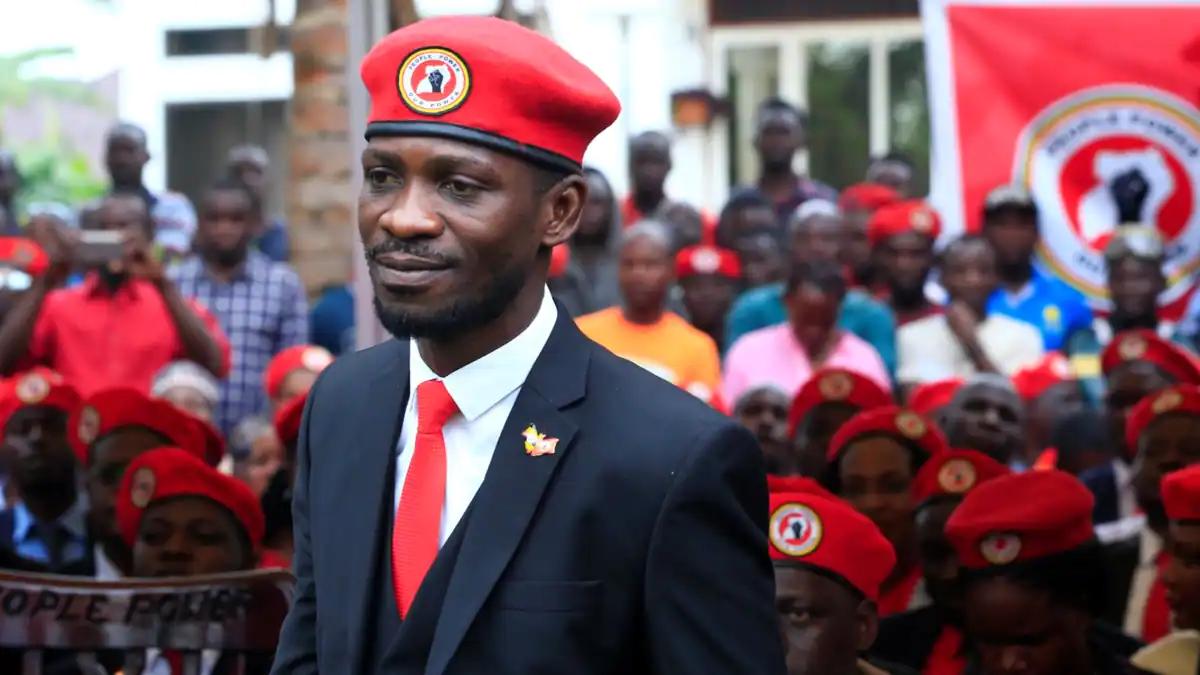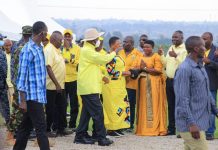Faridah N Kulumba
Africa-Press – Uganda. Robert Kyagulanyi alias Bobi Wine the leader of Ugandan leading opposition party National Unity Platform (NUP) this week advised Kenyans not to copy the bad habits of neighboring country Uganda, by removing term limits from the Constitutional, following unconfirmed reports that a section of Kenyan Members of Parliament plan to make amendments in the Constitution that will remove term limits on the presidency.
Background
At the beginning of this week, A Kenyan legislator revealed plans to seek the scrapping of the country’s presidential term limit, noting that the cap should be on age, not period of service. The revelation was confirmed by Fafi county MP Salah Yakub who said that some United Democratic Alliance (UDA) lawmakers are working on a constitutional amendment Bill to replace the two-term limit with an age limit of 75 years.
President for decades
If the legislators who are proposing the plan of scraping the term limit plan succeed, they would give the newly sworn-in President William Ruto the leeway to seek re-election for four terms, or 20 years. Dr. Ruto is aged 55 and has not indicated any intention to contest beyond the current term limit.
Bobi fears No smoke without fire
According to NUP leader Kyagulanyi, there is no smoke without fire. He feared that some people may consider the plan ridiculous but it could turn into reality if Kenyans do not resist it.
Bobi’s advise
Mr. Kyagulanyi advised Kenyans to be vigilant in order to save their country from what he dubbed as “Musevenism.” He also begged Kenyans to defend their Constitution before it’s too weak to defend them. explained that this is how the President of Uganda Yoweri Kaguta Museveni began schemes to remove term and age limits.
Last month some of President Museveni’s ministers endorsed him for the presidency for the 2026 election, only a year after when he was elected for his sixth term. In 2026 Museveni will be 82 years old which does not disqualify him because in 2017 Uganda’s Constitution was amended and the removal of the previous upper age limit of 75 years was announced. If the three minister’s endorsement succeeds, Museveni will be standing for the 7th term which is allowed due to the fact that Ugandan presidential term limits were removed in 2005.
Ruto and Museveni’s relationship
Ruto shares a close relationship with the long-serving President Museveni. He had made frequent visits to Uganda including in 2015 when he joined President Museveni at a campaign rally in Kapchorwa, attending the launch of the Kachorwa-Suam road that links to Kenya in 2018, and a private visit to State House Kampala in 2019. In August 2021 Ruto was blocked by the former Kenyan government from flying to Uganda for a private meeting with Museveni.
In January this year, President Museveni vowed not to take sides in the Kenyan Presidential election that took place on 9th August. President Museveni was dispelling claims and rumors that Uganda’s ruling party National Resistance Movement (NRM) supported Ruto. President Museveni explained that the elections in Kenya or any other African country are matters of the people of that country.
What does Kenya’s Constitution say about the term limits?
Article 1429(2) of Kenya’s Constitution strictly limits the president to serve two five-year terms in office which the legislators say should instead be swapped with age-limit which was lifted in 2004. Kenya has over time been praised as an emerging democracy in Africa after the peaceful transfer of power.
Ruto’s struggle for the presidency
Kenya’s general elections took place on 9th August 2022, and on Monday 15th August 2022, Kenya’s IEBC Mr. Chebukati announced Ruto as Kenya’s 5th President winning his bitter rival Orange Democratic Movement Raila
Ruto’s way to the top office met several challenges starting with the four Independent Electoral and Boundaries Commission (IEBC) Commissioners disowning the results that were announced by chairperson Wafula Chebukati. On 22 August, opposition leader Raila petitioned Kenya’s Supreme Court challenging the election results. He alleged that the tally had involved “criminality.
In September Kenya’s Supreme Court upheld the results declaiming Ruto winner of the August 2022 presidential elections. The Supreme Court unanimously rejected Odinga’s claims and decided that IEBC held a credible election. On 15th September Ruto was sworn in as the fifth president of Kenya.
Kenya’s past elections challenges
Elections have been along ethnic lines in many Kenyan communities and have been witnessed in several elections. Between 2007 and 2008, political violence, economic and humanitarian crises erupted in Kenya after former President Kibaki was declared the winner of the presidential election held on December 27, 2007. These elections were fiercely disputed and triggered widespread violence throughout the country.
This was the most violent crisis that had hit Kenya since the Mau-Mau uprising. From the general election day and signing of the power-sharing agreement to 28 February 2008, Kenya was on the brink of civil war. In only two months, over a thousand people were killed and about 350,000 were forced to move around in search of refuge (Karabo, 2008). Subsequent reports point to almost 1,500 deaths and nearly 700,000 people internally displaced due to post-election violence.
Although there no much violence after the victory of the Jubilee Alliance in the March 2013 elections, with a tightly contested vote (with Jubilee avoiding a run-off by less than 1 percent) and yet again evidence of voting irregularities (Gettleman, 2013), the losing party and Kenyans turned to the courts instead of guns. However, it may not represent a trend nor the overcoming of the drivers of conflict but instead, a belief in the credibility (though fragile) of the institutions created or reformed under the new Constitution. However, many challenges still remain unresolved.
August 2022 election praises
On 11th August the Joint African Union-COMESA Election Observers to the General Election in Kenya issued a preliminary statement on its assessment of the election. The Head of Mission and former Siera Leone President Dr. Ernest Bai Koroma, who presented the statement said that the Mission through their observations of the 9th August 2022 Kenya’s elections was conducted in a comparatively peaceful environment.
The Joint African Union observers congratulated the authorities and Kenyans for their efforts toward holding successful elections and deepening democratic rule, which is a prerequisite for sustainable socio-economic development in the country.
For More News And Analysis About Uganda Follow Africa-Press






